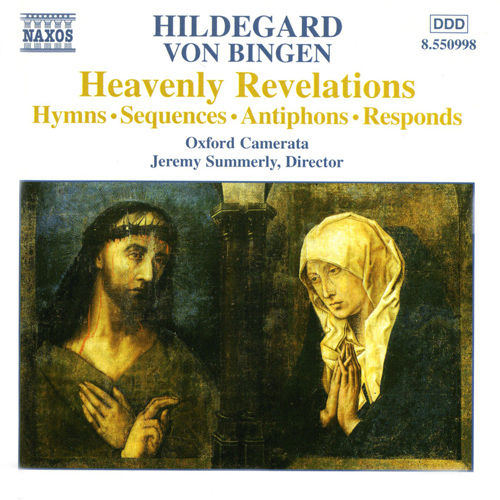|
|
|
01 |
O Euchari |
|
|
|
08:56 |
|
|
02 |
Alleluia - O virga mediatrix |
|
|
|
03:37 |
|
|
03 |
Ave generosa |
|
|
|
06:32 |
|
|
04 |
Laus Trinitati |
|
|
|
01:30 |
|
|
05 |
Kyrie |
|
|
|
04:32 |
|
|
06 |
O presul vere |
|
|
|
08:22 |
|
|
07 |
O ignis spiritus |
|
|
|
05:53 |
|
|
08 |
Procession from "Ordo Virtutum" |
|
|
|
04:30 |
|
|
09 |
O pastor animarum |
|
|
|
01:29 |
|
|
10 |
O viridissima virga |
|
|
|
05:28 |
|
|
11 |
O virga ac diadema |
|
|
|
07:59 |
|
|
|
| Studio |
Chapel of Henford College |
| Country |
United Kingdom |
| Original Release Date |
1995 |
| Cat. Number |
8.550998 |
| Packaging |
Jewel Case |
| Recording Date |
1993 |
| Spars |
DDD |
| Sound |
Stereo |
|
| Vocal |
Carys-Anne Lane |
| Vocal |
Rebecca Outram |
| Vocal |
Andrew Carwood |
| Vocal |
Sterence Rice |
| Vocal |
Lisa Beckley |
| Vocal |
Deborah Mackay |
| Vocal |
Robert Evans |
| Vocal |
Michael McCarthy |
|
| Conductor |
Jeremy Summerly |
| Producer |
Jeremy Summerly; Judy Lieber |
|
Hildegard von Bingen (1098-1179)
Heavenly Revelations
Hymns, Sequences, Antiphons, Responds
Born into the Rhenish aristocracy in 1098, Hildegard entered a convent eight years later because she was her parents' tenth child; she spent the remainder of her eighty years as a nun, the latter half as abbess of her own convent. Hildegard was not universally popular during her lifetime: the establishment of her own convent at Rupertsberg near Bingen (into which she attracted twenty nuns of noble birth) smacked of elitism. Added to which, Hildegard's community apparently worshipped in fine jewellery and ostentatious headgear. Our stereotypical image of the frugal medieval abbess in enclosed orders may therefore be somewhat wide of the mark. It seems rather that the sensuality of Hildegard's music and poetry sprung from an increasingly individualistic view of high Benedictinism.
Hildegard became famous for her prophecies and visions which brought her consultations with the most powerful rulers of her day. She recorded her visions in a trilogy which she assembled over a period of thirty years whilst also compiling treatises on medicine and natural history. Hildegard's great musico-poetic collection was completed around the year 1150. Symphonia armonie celestium revelationem (Symphony of the harmony of heavenly revelations) is a collection of 77 songs and one music drama, the Ordo virtutum (a morality play whose subject is the struggle between seventeen Virtues and the Devil over the destiny of a female soul). The songs form a liturgical cycle for the church year: Ave generosa, O virga ac diadema, O viridissima virga, and the Kyrie and Alleluia are in honour of the Virgin Mary; Laus Trinitati, O ignis vpiritus, and O pastor am arum celebrate various aspects of the Trinity; and O Euchari and O presul vere are sequences praising St Eucharius and St Disibod respectively.
Critics remain divided as to the assessment of Hildegard's competence as a poetess and musician. Her colourful imagery and capricious melodies can appear inspired or unpolished according to taste. To some her songs appear repetitive and formulaic; to others they are coherent miniatures of genius. And while Hildegard's lack of formal training in Latin results in inconsistencies and poor construction, the lack of grammatical convention enables a torrent of original imagery to bypass traditional poetic shackles.
Oxford Camerata
The Oxford Camerata was formed in order to meet the growing demand for choral groups specialising in music from the Renaissance era. It has since expanded its repertoire to include music from the medieval period to the present day using instrumentalists where necessary. The Camerata currently tours regularly within Europe and has made a variety of recordings for Naxos spanning the music of nine centuries.
Jeremy Summerly
Jeremy Summerly was a choral scholar at New College, Oxford, from where he graduated with First Class Honours in Music in 1982. For the next seven years he worked for BBC Radio and it was during this time that he founded the Oxford Camerata and undertook postgraduate research at King's College, London. In 1989 he became a lecturer at the Royal Academy of Music and in the following year he was appointed conductor of Schola Cantorum of Oxford. In 1991 he signed a long-term contract with Naxos to record a variety of music with Schola Cantorum and the Oxford Camerata.
